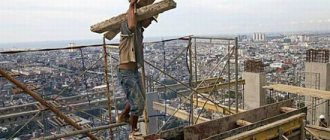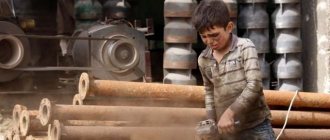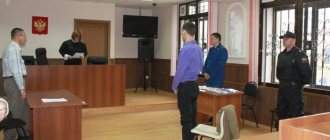Common Cases
Most often, liability for violation of labor protection legislation occurs in the following cases:
- non-compliance with the rule on mandatory training on safe work practices (lack of internship, refusal to test knowledge, hiring an untrained employee, lack of training for the management of the enterprise, etc.);
- non-compliance with the established work and rest schedule (involvement of an employee in activities at night and on weekends without his consent, involvement in overtime work, failure to record it, non-compliance with requirements for the duration of continuous rest);
- lack of personal protective equipment;
- access to the facility without a mandatory medical examination;
- lack of workplace certification;
- failure to comply with the established procedure for investigating accidents;
- non-compliance with the rules of operation of devices and apparatus;
- organization of work that does not meet mandatory requirements.
Civil liability
Civil liability is one of the types of legal liability, which represents the legal consequences established by the rules of law of non-fulfillment or improper fulfillment by a person (legal or physical) of the duties provided for by law, which is associated with a violation of the subjective rights of another person (employee).
The civil liability of legal entities - employers (organizations) is provided for by legislative and regulatory acts, the Labor Code of the Russian Federation, the Civil Code (Civil Code) of the Russian Federation and special acts.
Financial liability for harm caused to health is also provided for in civil legal relations and is regulated by Chapter 59 of the Civil Code of the Russian Federation. If a citizen is injured or otherwise damaged his health, the victim’s lost earnings (income) that he had or could definitely have, as well as additional expenses incurred due to damage to health, including expenses for treatment, additional food, and the purchase of medicines, are subject to compensation. , prosthetics, outside care, sanatorium and resort treatment, purchase of special vehicles, preparation for another profession, if it is established that the victim needs these types of help and care and does not have the right to receive them free of charge.
Kinds
Disciplinary responsibility
A reprimand, reprimand, and even dismissal, if there are grounds, for example, when a sign of repeated violation is established, are disciplinary sanctions for violation of labor protection requirements. They are listed in Art. 192 Labor Code of the Russian Federation. Sometimes a one-time significant violation is enough for dismissal if serious consequences have occurred (subsection “e”, paragraph 6 of Article 81 of the Labor Code of the Russian Federation). These types of disciplinary sanctions are applied only to employees holding a certain position at the enterprise.
IMPORTANT!
Punishment cannot be imposed if more than a month has passed since the discovery of the offense.
Material liability
You can punish with the ruble, in accordance with Chapters 38 and 39 of the Labor Code of the Russian Federation, both the employer and the employee. In accordance with Art. 238, 246 of the Labor Code of the Russian Federation, when determining damage caused by an employee, the following is taken into account:
- only direct actual damage is compensated, lost profits are not taken into account;
- guilt and the connection between the offense and the resulting consequences must be established;
- damage is determined based on actual losses taking into account market prices.
At the same time, the administration has the right not to subject the worker to punishment in accordance with Art. 240 Labor Code of the Russian Federation.
Administrative responsibility
When it is established that a guilty offense has been committed in relation to the organization of activities and workplaces, administrative liability arises for violation of labor protection requirements (under Article 5.27.1 of the Code of Administrative Offenses of the Russian Federation). Fines are imposed exclusively on management, officials, organizations or enterprises:
for officials and individual entrepreneurs - from 2000 to 5000 rubles;
for legal entities - from 50,000 to 80,000 rubles.
For repeated violations, fines reach 40,000 in the first case and 200,000 in the second.
Criminal liability
Provided only in certain cases. If a violation of labor protection requirements is established, resulting in the death of a person or causing serious harm to health, the punishment will be applied under Art. 143 of the Criminal Code of the Russian Federation. Only individuals who have been entrusted with the responsibility to comply with occupational safety rules can be involved.
In case of causing serious harm: up to 40,000 (or income for 18 months, or correctional labor for up to 2 years, or imprisonment for up to 2 years).
In case of death of 1 person: forced labor or imprisonment for up to 4 years.
In case of death of 2 or more persons: up to 5 years.
Material liability
The employer must take care in advance to include a provision on financial liability in the text of the employment contract, or sign an additional agreement with the employee. After an employee learns that he is financially responsible within the framework of his position, if damage is caused to the organization, he will be obliged to compensate it.
Conditions for bringing employees to financial liability
In order for an employer to be able to hold an employee financially liable, the employee must be an adult and the following conditions must be met:
- the employee’s actions must be unlawful;
- there must be guilt in the actions (or inactions);
- There must be a causal connection between consequences and actions.
The employee is responsible only for the amount of his monthly earnings. The exception is cases when, through his fault, the employer paid certain amounts to the injured persons - in such a situation, the employee, in addition to direct damage, also compensates for these payments. According to Article 247 of the Labor Code of the Russian Federation, the employee is obliged to compensate for material losses if his guilt is proven by the employer and such damage can be calculated. At the same time, according to Article 238 of the Labor Code of the Russian Federation, the employer’s lost profits are not taken into account. It should be noted that, according to Article 240 of the Labor Code of the Russian Federation, the employer may completely or partially refuse to receive compensation for damage from the guilty party.
Act on violation of labor protection requirements
In order to establish the employee’s responsibility for violating labor protection requirements and document identified cases of non-compliance with occupational safety rules, a report is drawn up. There is no unified form of the act, but it is worth providing all the document details accepted in practice in office work and entering all the necessary data:
- organization data (or draw up a document on a form);
- date, time and place of compilation;
- data of the employee, commission that issued the act;
- the essence of the offense itself with a detailed description of what happened;
- explanations of the persons involved;
- recommendations for compliance with labor safety rules;
- application: documents, explanatory notes, reports;
- signatures of all participants, including the offender.
Drawing up an act will help avoid disputes and identify specific culprits for failure to comply with labor protection requirements.
Along with sanctions for failure to comply with safety regulations, there is also liability for violation of safety regulations; it can occur both in case of failure to comply with legally established norms, and in case of deviation from the conditions for organizing the activities of the enterprise, recognized as mandatory in local regulations.
Consequences of violating safety rules
Direct consequences
The direct consequences of violating safety regulations include:
- causing harm to individuals working at a hazardous enterprise or living in the surrounding area;
- causing harm to individuals through contamination of air and water with dangerous substances;
- the spread of radiation dangerous to the life and health of people and other living beings;
- soil contamination, as a result of which various plant crops cannot grow on it, or as a result of which plant crops change their natural structure;
- fires and explosions at businesses that threaten adjacent commercial and residential areas;
- emissions of hazardous, poisonous and toxic gases into the atmosphere.
Indirect consequences
Indirect consequences can affect even those citizens who live far from the place of the incident:
- resettlement of people from the disaster zone;
- deterioration of the environmental situation;
- job cuts;
- public discontent;
- mass riots;
- social tension;
- extinction of fauna and flora;
- temporary loss of work by people (for example, until the enterprise is restored).
The legislative framework
When appealing a safety violation by an employer, the following regulations must be followed:
- “Labor Code of the Russian Federation” dated December 30, 2001 N 197-FZ.
- “Civil Procedure Code of the Russian Federation” dated November 14, 2002 No. 138-FZ.
- “Criminal Code of the Russian Federation” dated June 13, 1996 N 63-FZ;
- Federal Law “On the procedure for considering appeals from citizens of the Russian Federation” dated May 2, 2006 N 59-FZ;
- Federal Law “On the Prosecutor's Office of the Russian Federation” dated January 17, 1992 N 2202-1.
To court
To protect violated rights, a citizen has the right to go to court, including in parallel with appeals to the labor inspectorate or the prosecutor’s office. By concluding an employment contract, the employer assumes obligations to ensure safe work. Violations of the conditions of labor interaction can be addressed to the court if the consequences did not cause serious harm to human health - in this case, this is criminal jurisdiction.
In addition to the restoration of violated rights, claims can include compensation for moral damage or harm to health (for example, the occurrence of occupational diseases). If proceedings with management led to suspension or dismissal, you can also apply for reinstatement and payment of wages (Article 236 of the Labor Code of the Russian Federation).
You should apply to a court of general jurisdiction at the location of the organization, but you can also apply at the place of residence of the employee or at the location of the company’s branch (clause 6.3, clause 9 of Article 29 of the Code of Civil Procedure of the Russian Federation).
Statement of claim
The claim is drawn up in accordance with the provisions of Art. 131 Code of Civil Procedure of the Russian Federation, the following information is indicated:
- name and address of the court;
- applicant details;
- details of the defendant (name and address of the organization);
- the plaintiff’s demands (I ask: compensation for the damage caused, reinstatement at work...)
- circumstances, arguments about the illegality of actions with reference to the law;
- list of applications;
- date and signature.
Important: state fees are not charged in cases of restoration of labor rights (Article 393 of the Labor Code of the Russian Federation).
you can here
Where to complain about management actions
If labor safety rules are violated by an employee, this is the responsibility of the employer, who must ensure their compliance. If safety standards are regularly violated at an enterprise through no fault of the employee, then subordinates often cannot fight this state of affairs and are forced to either accept it or quit. The most common safety violations committed by responsible persons:
- ignoring the rules on fencing structures and other protective devices, especially at construction sites;
- permission to work without the necessary protective equipment (helmets, suits, masks) or the use of uncertified products;
- provision of outdated equipment that does not meet requirements or faulty equipment;
- lack of training and timely safety instructions;
- lack of necessary medical examinations;
- non-compliance with the rest regime, as a result of which overworked workers make mistakes.
However, the employee can defend his rights to safe work. For this purpose, there are several authorities that monitor compliance with labor law standards. If the employer does not ensure compliance with safety regulations, his actions can be appealed:
- To the State Labor Inspectorate (SIT). This organization is a supervisory body with broad powers to control labor relations.
- To the prosecutor's office . If the actions of management, as a result of violation of labor protection, have resulted or may result in danger to the life and health of people, this is a criminal offense, which the prosecutor's office is authorized to suppress. If, through the fault of management, a crime has occurred that the employee knows about, this must be reported to the police (for example, an accident at work or construction was hidden).
- To court. If a labor dispute or other conflict between an employer and a subordinate is associated with a violation of safety regulations, the employee can always go to court to protect his rights (for example, to seek compensation due to an occupational disease).
Note. There are situations when the director of an organization is not aware of violations occurring within departments (especially in large companies). Therefore, before writing to the supervisory authorities, it is worth writing a complaint addressed to the first person, describing the situation in it and referring to the violated norms of the law. In this case, it is better to indicate that if no measures are taken, the applicant will be forced to contact the authorized bodies. The complaint is drawn up in free form, and it is better to send it through the office, officially registering your appeal.
To the prosecutor's office
This body is authorized to monitor compliance with the legislation of the Russian Federation and carry out a supervisory function. If failure to comply with safety regulations has led or may lead to serious harm to health or death, which is a criminal offense, the prosecutor's office conducts an inspection of the company's activities.
The applicant contacts the prosecutor's office at the applicant's place of residence (address and contact numbers can be found on the Internet). The complaint is drawn up according to general rules; there is no special form provided for it. The document must include the following information:
- Full name of the prosecutor or the name and address of the prosecutor's office;
- Full name of the applicant, registration address;
- information about the organization, director;
- description of the situation;
- handling a resolution (holding the official and organization accountable);
- date, signature, list of attachments (it is advisable to provide materials proving violations, or refer to witnesses who can confirm this).
The prosecutor's office does not consider anonymous complaints. You can send your appeal by registered mail, or you can send your appeal online. To do this, you need to go to the Internet reception of the prosecutor's office in your region.
We recommend reading: How to write a complaint to the Prosecutor's Office
In GIT
In accordance with Article 356 of the Labor Code of the Russian Federation, the labor inspectorate exercises state control over compliance with labor standards and has the authority to regulate the field of labor protection. When a worker applies, the inspector will organize a verification of this information. If the examination shows violations, the State Labor Inspectorate issues orders regarding non-compliance with labor safety standards. The instructions of the state inspector are mandatory. If they are ignored, the officials and the company itself bear administrative responsibility (up to and including liquidation of the organization).
In addition, the employee can contact the inspectorate for consultation, where his rights will be explained to him.
To find a labor inspection department in a specific region, you must enter the name of the entity in the search bar on the official website www.rostrud.ru/inspections/. The website of the regional office contains contact information: telephone numbers where you can get advice, as well as the address where the appeal is sent.
How to file a complaint
A complaint about non-compliance with safety regulations is drawn up in free form, in accordance with the general rules of business documentation. The following information must be provided:
- The header of the document indicates the address of the State Tax Inspectorate and the employee’s details (full name, address).
- The text first of all informs about the place of work (full name of the company, address, telephone numbers), it is also advisable to provide information about the manager (full name, telephone number).
- The essence of the violations is described, indicating the dates and times; if the violations continue, this must be noted. It is advisable to provide evidence or refer to eyewitness accounts, but the inspector will have to conduct an inspection in any case, based on the fact of the statement. At the end there is a date and signature of the applicant.
It is better to attach a copy of the employment contract and evidentiary materials, if any, to the application. The document must be sent by registered mail with return receipt requested.
Note. A complaint about violations can be submitted electronically on the Federal Labor Inspectorate page onlineinspektsiya.rf/problems. In the form that appears, you must select the “occupational safety” category and fill out the fields.
This service allows you to promptly report violations, as well as consult with the inspector on duty by filling out the request onlineinspection.rf/questions/?question_type=faq, a response to which will be given within 3 business days.
We recommend reading: How to complain to the labor inspectorate








